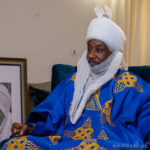Nigeria is working closely with international and local partners to track and identify the sources of improvised explosive drones reportedly being used by terrorists, Defence Minister Mohammed Badaru Abubakar said on Wednesday.
Speaking during the 2025 Ministerial Briefing Series organized by the Ministry of Information and National Orientation in Abuja, Badaru dismissed claims that terrorists wield more sophisticated weapons than the Nigerian Armed Forces.
He described the current security challenge as unconventional and asymmetric, requiring more intelligence-driven responses than brute force.
“What we have seen so far are not sophisticated armed drones with strategic guidance systems,” Badaru clarified.
ALSO READ: Always embrace dialogue, not strike, Etsu Nupe urges poly lecturers
“They are civilian drones. small, commercial-grade devices – on which explosives are tied, usually between one and two kilograms. It’s purely improvisation.”
He added that the military, working with the Office of the National Security Adviser (ONSA), is ramping up intelligence efforts and has already made significant arrests of arms traffickers.
“We are beefing up our intelligence capacity, both locally and internationally, and taking steps to monitor the use of civilian drones across the country. We’re committed to identifying and cutting off the supply chain of these improvised weapons,” he said.
In response to recent remarks by members of the National Assembly suggesting that terrorists possess more advanced weaponry than Nigerian forces, the Minister firmly denied the claim.
“That is absolutely not true,” Badaru stated.
“We have far more sophisticated weapons and surveillance systems, including advanced drones. What we face is not a conventional war – it is a guerrilla war. Terrorists monitor us and exploit information from locals. That’s how they stage attacks when we least expect.”
Commenting on the National Assembly’s proposal for a national security summit, Badaru welcomed the idea but emphasized that robust strategy remains the backbone of Nigeria’s security response.
“Strategy is far more important than summits,” he said.
“But a summit can feed into strategy. It brings people together, offers useful insights, and allows us to refine our operations. I’ve met with former defence ministers and service chiefs to learn from their experiences. Our current chiefs are doing the same.”
The Defence Minister’s remarks come amid growing concerns about the evolving tactics of terrorist groups and the need for increased civilian-military cooperation in intelligence gathering and surveillance.
WATCH TOP VIDEOS FROM NIGERIAN TRIBUNE TV
- Let’s Talk About SELF-AWARENESS
- Is Your Confidence Mistaken for Pride? Let’s talk about it
- Is Etiquette About Perfection…Or Just Not Being Rude?
- Top Psychologist Reveal 3 Signs You’re Struggling With Imposter Syndrome
- Do You Pick Up Work-Related Calls at Midnight or Never? Let’s Talk About Boundaries






